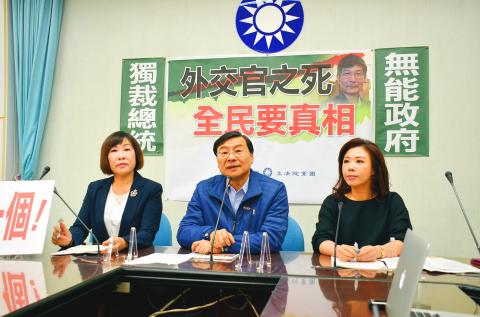The Chinese Nationalist Party (KMT) caucus yesterday called on the Executive Yuan to establish an ad hoc panel to investigate whether it was false news or rather accusations by Taipei Economic and Cultural Representative Office in Japan officials that drove former director-general of the office’s Osaka branch Su Chii-cherng (蘇啟誠) to suicide.
Since Su died at his residence on Sept. 14, the Ministry of Foreign Affairs has not shown any interest in investigating the incident, ascribing Su’s death to false news about the Chinese consulate in Osaka sending shuttle buses to pick up Taiwanese stranded at Kansai International Airport during Typhoon Jebi on the condition that they identified as Chinese, KMT caucus secretary-general William Tseng (曾銘宗) told a news conference at the Legislative Yuan in Taipei.
The KMT caucus condemns the ministry’s passive attitude and demands that the Executive Yuan conduct a three-month investigation into the incident by assembling a panel of members from objective third parties so that Su’s reputation can be cleared and he can rest in peace, Tseng said.

Photo: Huang Hsin-po, Taipei Times
KMT Legislator Lu Yu-ling (呂玉玲) said the legislature should establish a review panel to find out whether the ministry had shielded anyone and whether Su had died a wrongful death.
Lu said that the ministry had told her that Taiwan-Japan Relations Association Secretary-General Chang Shu-ling (張淑玲) telephoned Su on its behalf a day before his death, during which she allegedly scolded Su for 20 minutes.
Chang yesterday denied making such a call.
The ministry should clear up the confusion, Lu said.
Citing a statement that Representative to Japan Frank Hsieh (謝長廷) issued on Friday in response to accusations by Su’s widow that “anticipated humiliation,” not false news, drove him to take his own life, KMT Legislator Lee Yen-hsiu (李彥秀) criticized Hsieh for confronting Su’s family with a report by Japanese public broadcaster NHK that partly attributed Su’s suicide to him “being overwhelmed by public criticism.”
The move shows that Hsieh is still trying to shirk responsibility by blaming Su’s death on false news, Lee said.
She called on Hsieh to return to Taipei for a meeting of the legislature’s Foreign Affairs and National Defense Committee tomorrow to give a clear account of the events.

A preclearance service to facilitate entry for people traveling to select airports in Japan would be available from Thursday next week to Feb. 25 at Taiwan Taoyuan International Airport, Taoyuan International Airport Corp (TIAC) said on Tuesday. The service was first made available to Taiwanese travelers throughout the winter vacation of 2024 and during the Lunar New Year holiday. In addition to flights to the Japanese cities of Hakodate, Asahikawa, Akita, Sendai, Niigata, Okayama, Takamatsu, Kumamoto and Kagoshima, the service would be available to travelers to Kobe and Oita. The service can be accessed by passengers of 15 flight routes operated by

Chinese spouse and influencer Guan Guan’s (關關) residency permit has been revoked for repeatedly posting pro-China videos that threaten national security, the National Immigration Agency confirmed today. Guan Guan has said many controversial statements in her videos posted to Douyin (抖音), including “the red flag will soon be painted all over Taiwan” and “Taiwan is an inseparable part of China,” and expressing hope for expedited reunification. The agency last year received multiple reports alleging that Guan Guan had advocated for armed reunification. After verifying the reports, the agency last month issued a notice requiring her to appear and explain her actions. Guan

GIVE AND TAKE: Blood demand continues to rise each year, while fewer young donors are available due to the nation’s falling birthrate, a doctor said Blood donors can redeem points earned from donations to obtain limited edition Formosan black bear travel mugs, the Kaohsiung Blood Center said yesterday, as it announced a goal of stocking 20,000 units of blood prior to the Lunar New Year. The last month of the lunar year is National Blood Donation Month, when local centers seek to stockpile blood for use during the Lunar New Year holiday. The blood demand in southern Taiwan — including Tainan and Kaohsiung, as well as Chiayi, Pingtung, Penghu and Taitung counties — is about 2,000 units per day, the center said. The donation campaign aims to boost

The Central Weather Administration (CWA) said a magnitude 4.9 earthquake that struck off the coast of eastern Taiwan yesterday was an independent event and part of a stress-adjustment process. The earthquake occurred at 4:47pm, with its epicenter at sea about 45.4km south of Yilan County Hall at a depth of 5.9km, the CWA said. The quake's intensity, which gauges the actual effects of a temblor, was highest in several townships in Yilan and neighboring Hualien County, where it measured 4 on Taiwan's seven-tier intensity scale, the CWA said. Lin Po-yu (林柏佑), a division chief at the CWA's Seismological Center, told a news conference